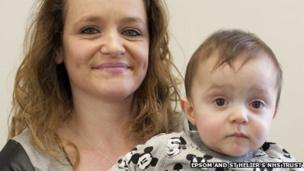Kelly Moseley, from Birmingham, endured 11 miscarriages each at about eight weeks before she contacted a miscarriage expert she had seen on television.
Hassan Shehata discovered that Kelly's pregnancies were being attacked by "natural killer cells" present in her body and decided to treat her with hydroxychloroquine.
Initially, Kelly continued to miscarry - including losing two babies at five months - before one year of taking the drug, she found out she was pregnant and Tyler was born in April 2013. He is now nine months old.
Kelly had been trying for a baby since 2002 when she married her husband Alan.
Even though all her family and friends begged her to stop trying after so many heart-breaking miscarriages, she refused to give up.
When she saw Mr Shehata interviewed about his work helping women who had experienced recurrent miscarriages, she was encouraged and made contact with him.
Eventually she was referred to the consultant obstetrician and gynaecologist's clinic at Epsom and St Helier University Hospitals NHS Trust in Surrey.
Killer cells
Mr Shehata and his colleagues had spent many years researching why some women's bodies reject pregnancies and their work was focused on natural killer cells which are present in everyone's white blood cells.
He said: "We found that some women's natural killer cells are so aggressive they attack the pregnancy, thinking the foetus is a foreign body - and that's what was happening to Kelly.
"Natural killer cells can be lowered by giving some women steroids - but for Kelly this didn't work so we tried an anti-malaria treatment which also lowers the immune system."
Mr Shehata said Kelly was the first patient to receive this treatment, in tablet form, of the immune modulator drug hydroxychloroquine.
Finally, she became pregnant with Tyler and although the pregnancy was complicated by pre-eclampsia, he was safely delivered at 28-29 weeks weighing just under 3lbs.
No 'holy grail'
"I still can't believe Tyler is here," Kelly says.
"I just refused to give up hope and I hope our story encourages other women out there too.
"I will never forget the babies I've lost but having Tyler makes it all worthwhile."
Mr Shehata told BBC Radio 5 Live that he has since treated 10 to 15 women with the drug and found it had a 70% success rate.
"It's important to say that it's not the holy grail, it's not for treating everyone.
"But hydroxychloroquine has been shown to be very safe in pregnancy."
Tyler spent a lot of time in a special baby care unit in Birmingham before he was allowed to come home, but he is now preparing to celebrate his first birthday in April surrounded by the whole family.
A spokesperson from the Royal College of Obstetricians and Gynaecologists said it was "interested" to hear that this drug could help women who suffer recurrent miscarriages, who tend to have problems with their immune system, but that it wasn't "standard practice".

No comments:
Post a Comment